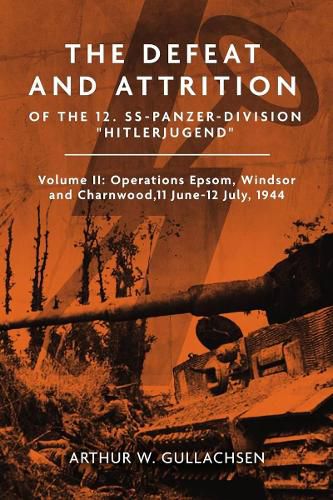Readings Newsletter
Become a Readings Member to make your shopping experience even easier.
Sign in or sign up for free!
You’re not far away from qualifying for FREE standard shipping within Australia
You’ve qualified for FREE standard shipping within Australia
The cart is loading…






Following the Normandy landings, Rommel rushed Heeresgruppe B reserves towards the coast in order to crush the bridgehead and drive the Allied forces back into the sea. One of these armored reserves was the newly created 12. SS-Panzer-Division Hitlerjugend. Extremely well equipped and at near full strength by mid-1944 standards, it was seen as an extremely capable formation. As Allied forces flooded inland from the beaches, 12. SS-Panzer-Division attempted to capture and hold the battlefield initiative. However, despite this German armoured division's best efforts, it would be bludgeoned and driven back in a series of offensive set-piece operations by the British Second Army, supported by massive artillery programs and RAF air strikes. As a result, the division failed to succeed in its new defensive role, and was slowly weakened by attrition, reducing its combat arms regiments to a weakened Kampfgruppe by mid-July. This volume focuses on the fighting between 11 June and 12 July: the Cristot triangle; the Parc de Boislonde; Fontenay-le-Pesnel; Operation Epsom and the main events of the Battle of the Odon; Operation Windsor and the attack on Carpiquet airfield; and finally the massive Anglo-Canadian assault on Caen, Operation Charnwood. A detailed set of appendices will analyze German personnel, equipment, and armored losses during the battles, and losses inflicted on the Allies. AUTHOR: Captain Arthur W. Gullachsen is the author of three previous books, as well as being a Fellow of the Royal Historical Society and a professor in the RMC History Department at the Royal Military College of Canada in Kingston, Ontario. After joining the Canadian Armed Forces (CAF) in late 2006, he gained acceptance into the PhD program in history at Western University in London, Ontario, graduating in 2016. A Second World War specialist, Captain Gullachsen's areas of expertise include the study of the replacement of equipment and personnel losses as well as German armored forces during the late war period. He is also interested in twentieth-century airpower and seapower. He recently published Bloody Verrieres, Volumes I and II with Casemate Publishers (2022 and 2023). 40 photographs and maps
$9.00 standard shipping within Australia
FREE standard shipping within Australia for orders over $100.00
Express & International shipping calculated at checkout
Following the Normandy landings, Rommel rushed Heeresgruppe B reserves towards the coast in order to crush the bridgehead and drive the Allied forces back into the sea. One of these armored reserves was the newly created 12. SS-Panzer-Division Hitlerjugend. Extremely well equipped and at near full strength by mid-1944 standards, it was seen as an extremely capable formation. As Allied forces flooded inland from the beaches, 12. SS-Panzer-Division attempted to capture and hold the battlefield initiative. However, despite this German armoured division's best efforts, it would be bludgeoned and driven back in a series of offensive set-piece operations by the British Second Army, supported by massive artillery programs and RAF air strikes. As a result, the division failed to succeed in its new defensive role, and was slowly weakened by attrition, reducing its combat arms regiments to a weakened Kampfgruppe by mid-July. This volume focuses on the fighting between 11 June and 12 July: the Cristot triangle; the Parc de Boislonde; Fontenay-le-Pesnel; Operation Epsom and the main events of the Battle of the Odon; Operation Windsor and the attack on Carpiquet airfield; and finally the massive Anglo-Canadian assault on Caen, Operation Charnwood. A detailed set of appendices will analyze German personnel, equipment, and armored losses during the battles, and losses inflicted on the Allies. AUTHOR: Captain Arthur W. Gullachsen is the author of three previous books, as well as being a Fellow of the Royal Historical Society and a professor in the RMC History Department at the Royal Military College of Canada in Kingston, Ontario. After joining the Canadian Armed Forces (CAF) in late 2006, he gained acceptance into the PhD program in history at Western University in London, Ontario, graduating in 2016. A Second World War specialist, Captain Gullachsen's areas of expertise include the study of the replacement of equipment and personnel losses as well as German armored forces during the late war period. He is also interested in twentieth-century airpower and seapower. He recently published Bloody Verrieres, Volumes I and II with Casemate Publishers (2022 and 2023). 40 photographs and maps